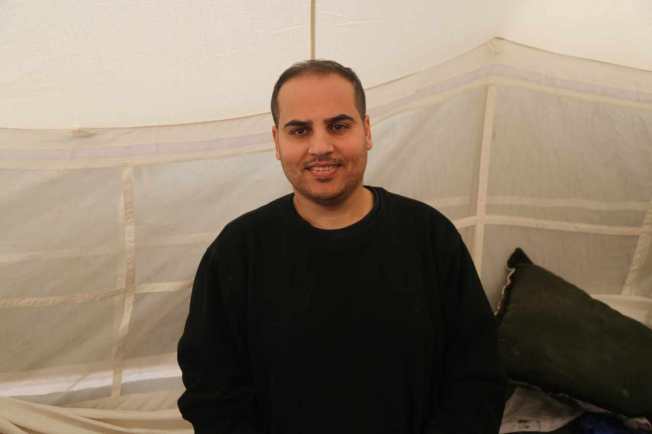Sunday, April 7, marks six months since the Israel-Gaza war began. Since October 7, 2023, CPJ has documented the killings of 90 Palestinian, two Israeli, and three Lebanese journalists and media workers—95 in total. We have recorded 25 journalists arrested, 16 journalists injured and four journalists missing. We have also reported on the attacks, arrests, threats, cyberattacks, censorship, and killings of journalists’ family members.
Diaa Al-Kahlout, the veteran Gaza bureau chief for the Qatari-funded, London-based newspaper Al-Araby Al-Jadeed, had been covering the Israel-Gaza war for two months when he became a part of the news. On December 7, Al-Kahlout was detained with members of his family by Israeli forces in a mass arrest in Beit Lahya in northern Gaza.
Al-Kahlout is one of more than two dozen Palestinian journalists arrested by Israel since it launched a widespread bombardment of Gaza following the October 7 Hamas raid on Israel. In a new Q&A published today, Al-Kahlout told CPJ how, over 33 days in Israeli custody, he was interrogated about his journalism and subjected to physical and psychological mistreatment.
“The truth is, that the outside world sees only 1% of the reality in Gaza, and what we [journalists] see is unimaginable,” Al-Kahlout told CPJ, and goes on in the interview to detail his experience covering the war, his detention, and the journalism environment in Gaza.
Read more in CPJ’s new feature article.
Other press freedom developments related to the Israel-Gaza war this week:
- CPJ calls on Netanyahu’s government not to shut down Al-Jazeera in Israel.
- CPJ and 41 other media freedom organizations write to Media Freedom Coalition member states to act on Gaza.
- CPJ and partners urge UN leaders to release their full report on journalist Issam Abdallah’s murder.
- Disinformation and incitement campaigns target Palestinian journalist Younis Tirawi.
- Tunisian authorities arrest, charge journalist Mohamed Boughaleb
- CPJ urges Sudan authorities to end suspensions of three news outlets
- Exiled Iranian journalist Pouria Zeraati stabbed in London
- Haitian journalist, YouTuber kidnapped by gang members, released
- Peruvian authorities target journalist Gustavo Gorriti in bribery probe
- Nigerian soldiers hit and detain journalist Dele Fasan, thugs attack three journalists covering election
- Togo journalist Apollinaire Mewenemesse detained for defamation
- Angola’s proposed national security law threatens press freedom, puts journalists at risk
- Liberian law enforcement officers arrest, beat journalist Kasselee Sumo
- Kyrgyzstan president signs Russian-style “foreign agents” law
- Turkish journalists shot at, banned from observing vote count in local elections
- Russia extends detention of journalist Alsu Kurmasheva by two months; Russia detained journalist Antonina Favorskaya for two months for reporting on late opposition leader Navalny
- Rare rebuke for Chinese police who harassed state journalists covering gas explosion
- Sri Lanka arrests, investigates journalists G.P. Nissanka, Bimal Ruhunage
New York-based Hoda Osman has spent the past six months helping Gaza journalists replace cameras, laptops, and phones lost or damaged in the Israel-Gaza war. More than 5,500 miles away, in the occupied West Bank city of Ramallah, Wafa’ Abdel Rahman coordinates humanitarian supplies and cash assistance for reporters under Israeli bombardment, while Rania Khayyat, also in Ramallah, is in constant contact with dozens of Gaza journalists to understand their needs.
Together, these three women play a central role in the difficult task of supporting Gaza’s press corps at a time of unprecedented strife and loss amid Israeli attacks and restrictions on basic supplies.
“The day-to-day includes a lot of uncertainty and unpredictability. They have a home today, they might not have a home tomorrow. They have their family members with them today, they might lose them tomorrow. They themselves are alive today, they might be injured or killed tomorrow,” said Hoda Osman, executive editor of Arab Reporters for Investigative Journalism.
Read CPJ’s interviews with the three women in our new feature here.
What we are reading
- Investigating India: How smaller, independent news outlets are digging into politics in a key election year — Bhavya Dore, Global Investigative Journalism Network
- From discredit to censorship, what happens when power comes after the press in Latin America — Suhelis Tejero, LatAm Journalism Review
- Mapping a surge of disinformation in Africa — Africa Center for Strategic Studies
- Hundreds of journalists go into exile every year. These are the problems they face and how to tackle them — Laura Dulce Romero, Reuters Institute for the Study of Journalism
- ‘Humour is powerful’: Cartoons take on Uganda’s repressive government — Amy Fallon, Al Jazeera
